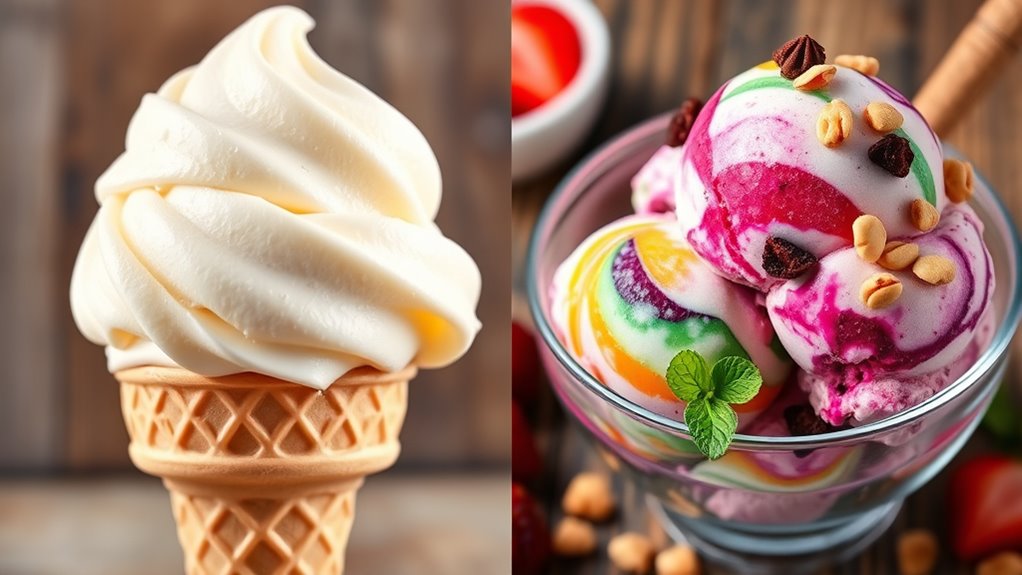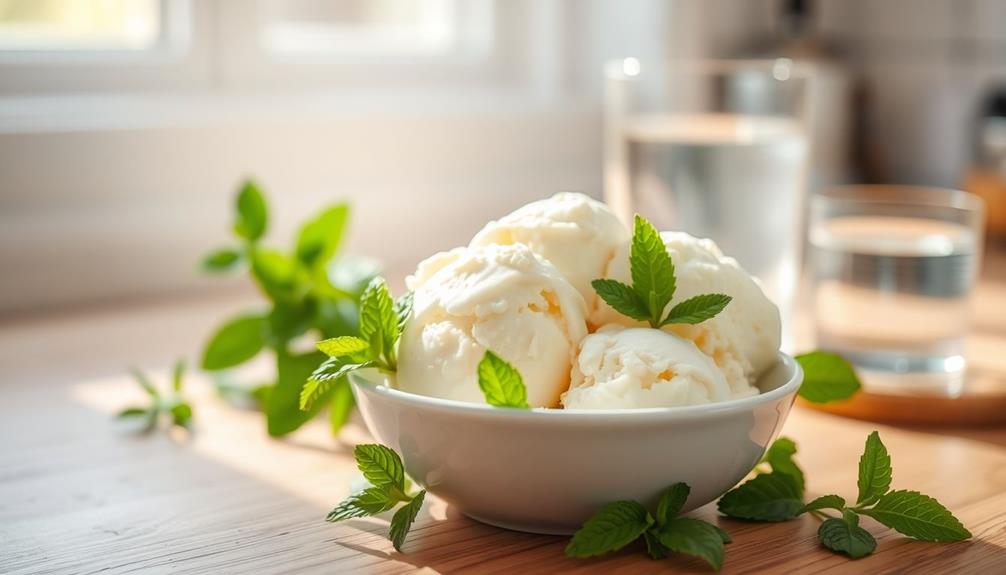When comparing vegan and dairy ice cream, you’ll find diverse flavors and textures in both. Vegan options can deliver creamy experiences using plant-based milks like cashew and oat, while dairy relies on milk fat. Nutritionally, vegan ice creams often pack fewer calories and healthier fats. They also cater to lactose-intolerant folks. Plus, you’ve got eco-friendly benefits with vegan choices. If you’re curious about market trends and innovations in this sweet showdown, keep exploring!
Key Takeaways
- Vegan ice cream offers diverse flavors that can rival dairy options, utilizing ingredients like cashew and oat milk for improved texture.
- Dairy ice cream typically has a creamier texture due to milk fat, while vegan options strive for creaminess through plant-based milks and stabilizers.
- Nutritionally, vegan ice cream often contains fewer calories and lower fat levels, while providing additional health benefits like omega-3 fatty acids from chia seeds.
- Environmental impacts differ, with dairy farming contributing significantly to greenhouse gases, while vegan ice cream production aligns more with sustainability goals.
- Consumer preferences are shifting towards vegan options, driven by health concerns, ethical considerations, and a demand for unique flavors and eco-friendly packaging.
Flavor Profile Comparison

When you plunge into the world of vegan ice cream, you’ll find a surprising variety of flavors that can rival their dairy counterparts. Brands like Jeni’s Dairy-Free offer unique options like Caramel Pecan Sticky Buns and Texas Sheet Cake, all while using a coconut cream base that doesn’t overpower the other flavors. Van Leeuwen surprises you with their Chocolate Oat Milk Cookie Dough Chunk, blending oat and cashew milk for a delightful twist. So Delicious’s Salted Caramel Cluster captures the essence of traditional ice cream, while Oatly’s chocolate and coffee flavors earn rave reviews. The increasing variety of non-dairy ice creams ensures that whether you prefer the richness of Ben & Jerry’s Non-Dairy flavors or the innovation of new combinations, vegan ice cream delivers a satisfying taste experience. Additionally, many vegan ice creams are made using plant-based ingredients, making them a healthier alternative for those looking to reduce their dairy intake. This variety also allows for exciting options like Birthday Cake Ice Cream, which combines classic flavors with the creaminess of a non-dairy base. Furthermore, incorporating chia seeds into frozen desserts can enhance their nutritional value by adding fiber and omega-3 fatty acids. Many of these flavors achieve a creamy texture similar to traditional ice cream, ensuring that you won’t miss the dairy.
Texture Analysis of Ice Creams
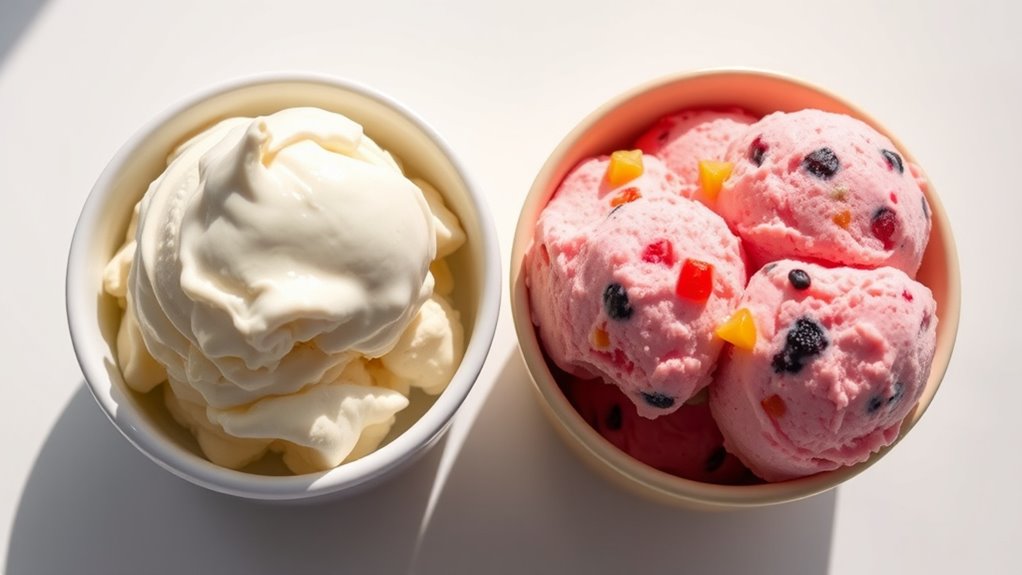
While exploring the texture of ice creams, you’ll quickly notice that dairy and vegan varieties present unique challenges and characteristics.
Dairy ice cream boasts a creamy texture thanks to milk fat and proteins. In contrast, vegan options rely on plant-based milks like almond and coconut, which require stabilizers like inulin and guar gum to mimic creaminess. Achieving a smooth texture remains a challenge for many producers, often leading to an icy consistency. Cashew and oat milk can improve texture, while increasing total solids helps reduce ice crystal formation. Recent focus on vegan ice cream consulting has led to innovative solutions for these textural challenges. Additionally, the use of freshly squeezed juices as natural flavor enhancers can help improve the overall sensory experience of vegan ice creams.
Sensory evaluations reveal that consumer acceptance varies, influenced by expectations shaped by traditional dairy ice cream. Continuous innovation is essential to enhance the texture of vegan alternatives and meet consumer demands.
Nutritional Breakdown of Vegan and Dairy Options
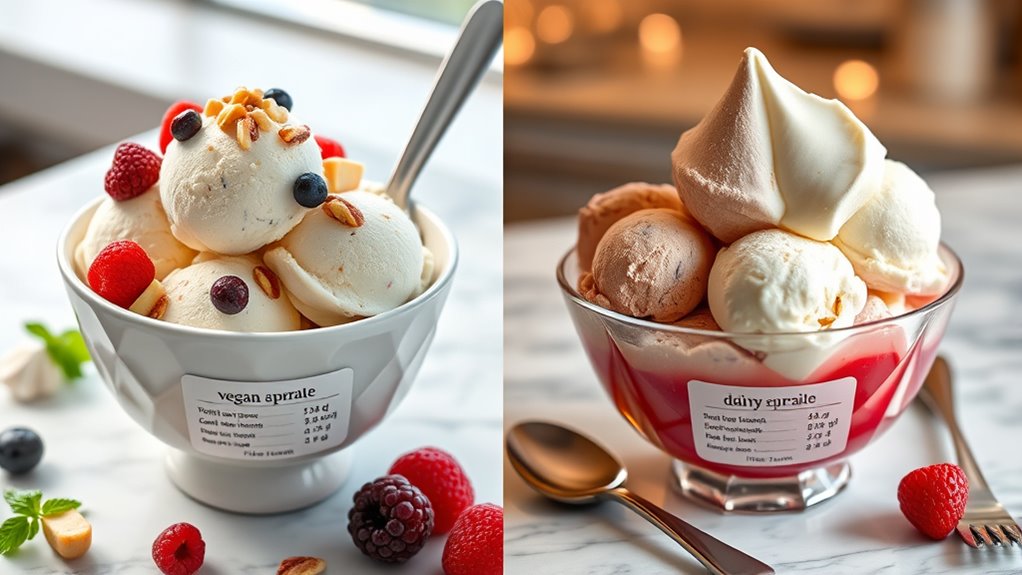
Vegan ice cream generally has around 320-476 calories per serving, with protein content varying considerably—protein-enriched options contain about 15g, while regular vegan varieties offer around 4.8g. In contrast, dairy ice cream typically ranges from 150 to over 200 calories per serving and provides more protein, about 5-9g. Both options can be high in sugar, often exceeding 10g per serving. While vegan ice creams mightn’t be fortified with micronutrients like calcium or vitamin D, dairy ice cream serves as a good calcium source, essential for bone health. Additionally, many vegan ice creams have a higher protein content compared to traditional options, making them a satisfying choice for those seeking to maintain muscle mass. Furthermore, vegan ice creams can be a good option for lower calorie intake, as they are often lower in calories compared to some dairy varieties. Chia seeds, often used in vegan desserts, are a great source of omega-3 fatty acids that can enhance the nutritional profile of ice creams. Incorporating chia seeds can also provide essential minerals that contribute to overall health. Consider these factors when choosing your ice cream. It’s important to note that a balanced diet should include adequate nutritional intake from various food sources to ensure overall health.
Health Benefits of Choosing Vegan Ice Cream
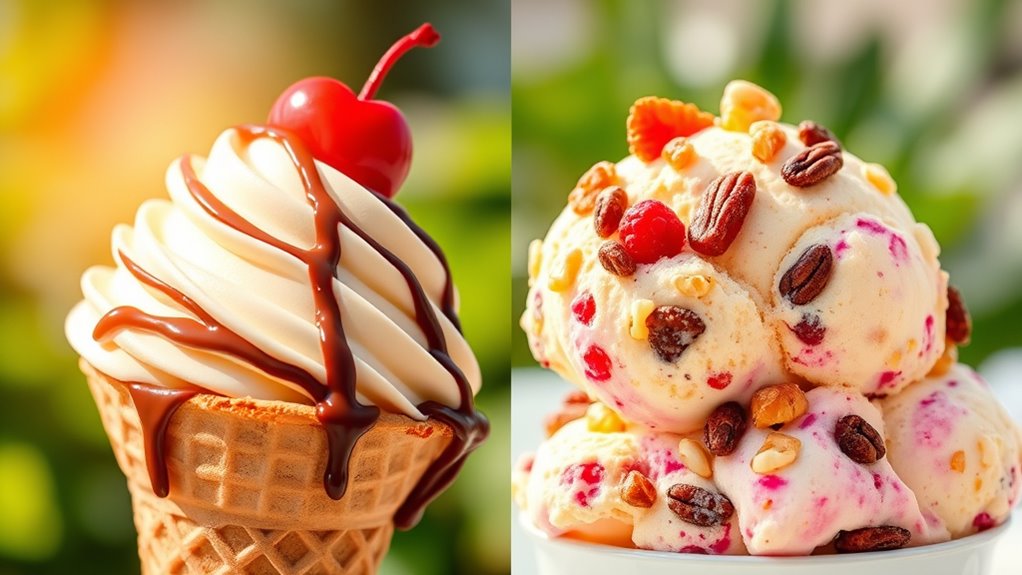
Choosing vegan ice cream can offer numerous health benefits that align with a more balanced lifestyle. For starters, it often contains fewer calories and lower fat levels, making it a great option for weight management. Additionally, a vegan diet often leads to greater nutrient diversity, allowing you to enjoy a wider range of vitamins and minerals. Studies suggest that a raw food diet can also contribute to increased energy levels, further enhancing your overall wellness. Incorporating chia seeds into your diet can further boost nutritional value, as they are rich in omega-3 fatty acids and fiber. Furthermore, many vegan ice creams incorporate unique fruit juice recipes that enhance their flavor and nutritional benefits.
By reducing dairy, you’ll likely consume less cholesterol and saturated fat, promoting better heart health. If you struggle with lactose intolerance, vegan ice cream can alleviate digestive discomfort, helping to improve your gut health. Furthermore, many vegan ice creams are made with plant-based ingredients that provide essential nutrients and antioxidants, enhancing your overall nutrition. Plus, many vegan options are packed with vitamins and antioxidants, enhancing your overall nutrition. Eliminating dairy can also lead to better skin health and increased energy levels.
Environmental Considerations in Ice Cream Production
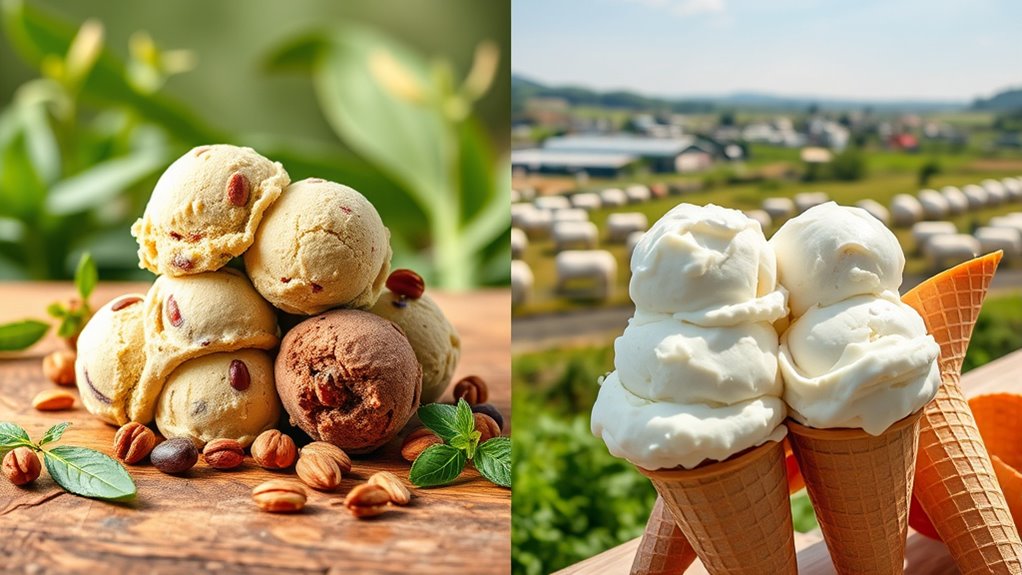
Ice cream production has a significant environmental impact, influencing everything from energy consumption to resource usage. The industry consumes large amounts of energy, especially during manufacturing and storage, while refrigerants like hydrofluorocarbons (HFCs) contribute to greenhouse gas emissions. Traditional dairy farming, essential for classic ice cream, accounts for about 4% of global greenhouse gases and requires around 1,000 liters of water to produce just one liter of milk. Additionally, billions of ice cream containers end up in landfills, leading to microplastic pollution. It is worth noting that the UK ice cream sector consumes approximately 17.3 PJ of primary energy annually, highlighting the substantial energy demand associated with production. Non-dairy alternatives may reduce some impacts, but ingredients like cocoa and palm oil can still lead to deforestation. As a consumer, being aware of these factors can guide your choices towards more sustainable options. Understanding filial responsibility laws can also help consumers make informed choices about their spending and support for environmentally friendly products. Moreover, choosing low-fat options can further mitigate the environmental footprint by reducing resource use in production. Increasing awareness of toilet paper disposal issues can also influence consumer behavior in reducing waste associated with traditional production methods. In contrast, the rise of vegan ice cream options offers an alternative that may align better with environmental sustainability goals.
Production Differences Between Vegan and Dairy Ice Cream

While both vegan and dairy ice creams aim to deliver delicious flavors and creamy textures, their production processes and ingredients differ considerably.
Vegan ice creams typically utilize plant-based milks like coconut, almond, or oat milk, while dairy ice creams rely on cow’s milk. For fat sources, dairy ice cream uses milk fat, whereas vegan varieties often incorporate coconut oil or cocoa butter. Vegan ice creams may achieve creaminess without using egg yolks or oil, providing a unique texture. Additionally, vegan ice creams often contain nutrient-rich ingredients that can enhance overall health, such as sound recording techniques that focus on achieving quality and consistency. Moreover, the use of solar-powered production methods can contribute to a more sustainable manufacturing process for both types of ice cream. Interestingly, many modern vegan ice cream brands emphasize high customer satisfaction ratings, ensuring that they meet consumer taste preferences effectively.
Stabilizers also vary; dairy ice cream contains natural casein, while vegan options may use plant-based gums like agar. The churning process is similar, but vegan ice creams may have shorter aging times due to faster crystallization.
Finally, vegan ice cream can be blended without machines, offering a simpler preparation method compared to traditional dairy ice cream.
Market Trends in Ice Cream Consumption
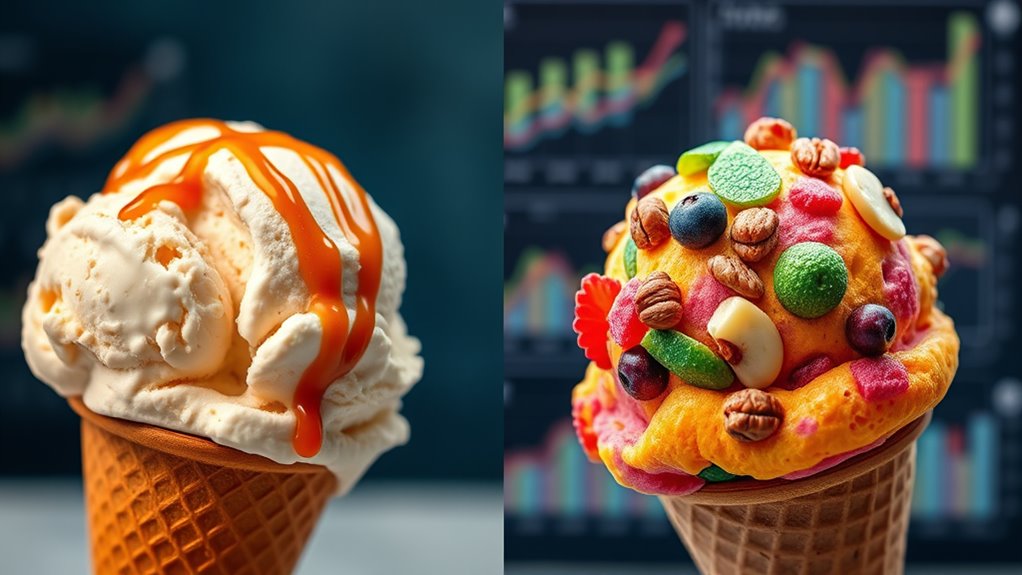
As the ice cream market evolves, consumer preferences and trends are shaping the landscape markedly.
You’ll notice that the global ice cream market is projected to grow markedly, from $80.03 billion in 2024 to $125.62 billion by 2033. Rising disposable incomes and a demand for high-end flavors drive this growth. This growth is also fueled by increased acceptance of online shopping and delivery services. Additionally, the rise of sustainable fashion is influencing food packaging choices, as consumers increasingly seek eco-friendly options.
Healthier options like low-sugar and dairy-free ice creams are increasingly popular, with nearly 1 in 5 consumers opting for products without artificial ingredients. Unique flavors and convenient snacking formats are gaining traction, while online shopping makes vegan options more accessible.
With sustainability in mind, eco-friendly packaging is becoming essential, reflecting a shift toward authenticity and locally sourced products in the ice cream industry.
Consumer Preferences: Vegan vs. Dairy
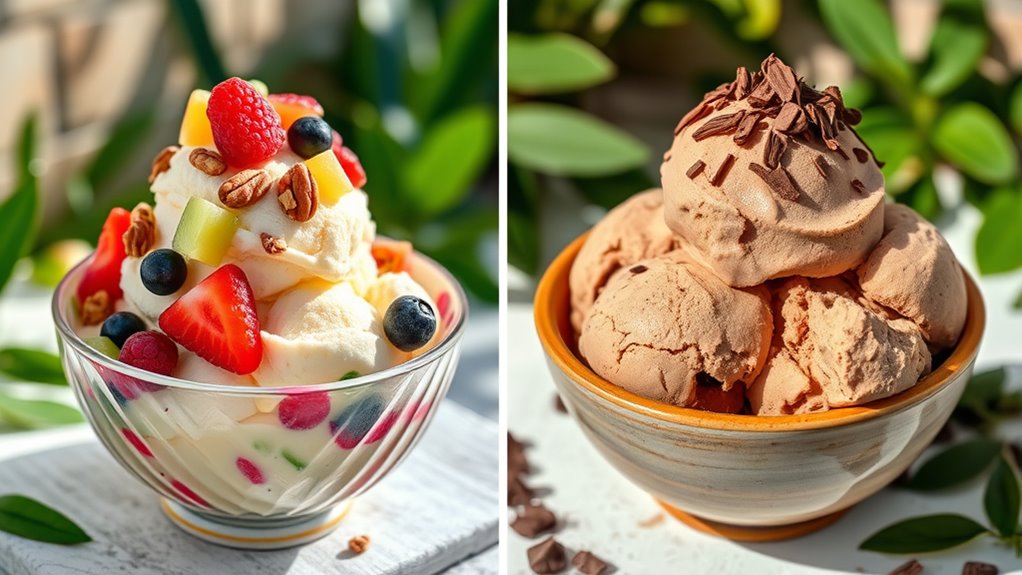
What drives your choice between vegan and dairy ice cream? Health and wellness concerns often lead many to prefer vegan options, thanks to lower cholesterol and lactose-free ingredients.
You might find that vegan ice cream offers unique flavors and textures, aligning with your desire for variety. Eco-consciousness also plays a role, as choosing plant-based options reduces environmental impact. Additionally, the global vegan ice cream market is projected to grow significantly, reflecting the increasing demand for these alternatives.
If ethical considerations matter to you, vegan ice cream reflects compassion towards animal welfare. Younger generations, especially, embrace these choices, influenced by social media and celebrity endorsements.
While familiar brands boost confidence in trying new plant-based treats, price sensitivity can guide your decisions, too. Ultimately, your preferences reflect a blend of taste, health, and values.
Innovations in Ice Cream Manufacturing
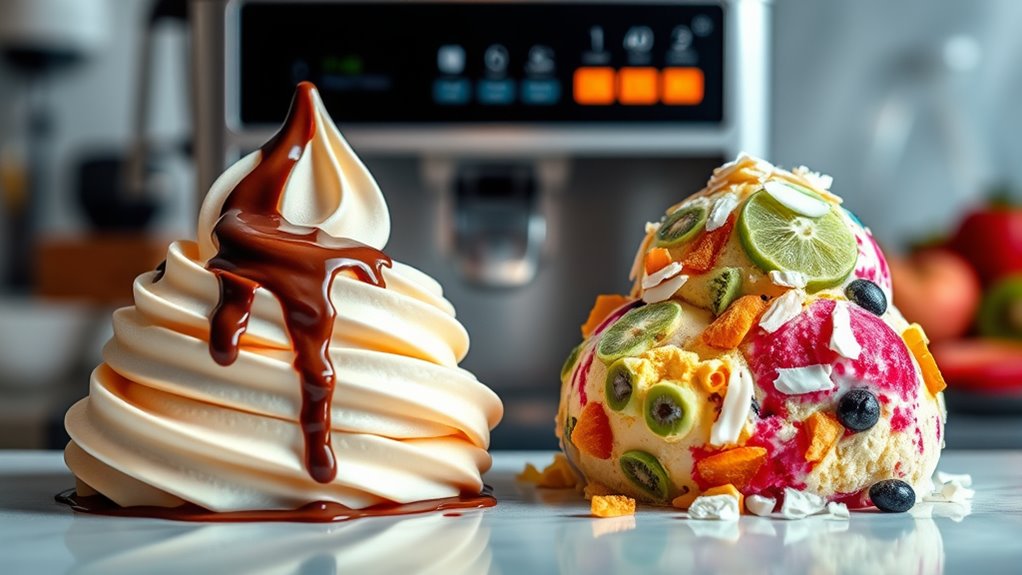
Consumer preferences for vegan and dairy ice cream are shaping not just what’s in your bowl but also how ice cream is made. Innovations like automation and robotics streamline production, ensuring consistency while enhancing efficiency. Techniques such as continuous freezing and blast freezing improve texture by preventing ice crystal formation. Mechanical refrigeration has played a crucial role in ensuring consistent cold temperatures throughout the manufacturing process. High-Pressure Processing (HPP) keeps your ice cream safe and fresh without preservatives. Smart ice cream makers use IoT technology to monitor temperature and reduce waste. On the sustainability front, plant-based options and biodegradable packaging minimize environmental impact. Meanwhile, flavor enhancement methods like microencapsulation and fermentation create unique taste experiences. All these advancements reflect a commitment to quality and sustainability in your favorite frozen treat.
Frequently Asked Questions
Are Vegan Ice Creams Suitable for Kids?
Yes, vegan ice creams are suitable for kids! Many children love the taste without realizing they’re enjoying a plant-based treat.
They often come in a variety of flavors that cater to kids’ preferences, and they can be healthier options with lower calories and natural sweeteners.
Plus, they’re lactose-free, making them perfect for lactose-intolerant kids.
With the growing availability of different brands, you’ll find plenty of exciting options for your little ones!
Can Vegan Ice Cream Melt Faster Than Dairy Ice Cream?
You might think all ice creams melt the same, but that’s not the case.
Yes, vegan ice cream can melt faster than dairy ice cream. It’s usually got a higher water content and lacks dairy’s stabilizing proteins.
While some vegan varieties include stabilizers to help, the absence of casein, a key protein in dairy, makes it more prone to melting.
How Do I Store Vegan Ice Cream Properly?
To store vegan ice cream properly, use airtight glass containers with silicone lids to maintain freshness.
Keep it in the back of your freezer, ideally at -15°C (5°F), to prevent melting. Cover the surface with cling film to avoid freezer burn, and try to consume it within two weeks for best quality.
Remember to use cold scoops when serving, and let it sit out briefly if it’s too hard to scoop.
Are There Any Allergens in Vegan Ice Cream?
While vegan ice cream can be a delightful treat, it’s essential to know that it might contain allergens.
You’ll often find nuts like almonds or coconut as bases, posing risks for those with specific allergies. Even if it’s dairy-free, cross-contamination can occur in shared facilities.
Brands are increasingly transparent about allergens, so check labels carefully. Your choice might be healthier, but always prioritize safety to enjoy your dessert worry-free!
Can I Make Vegan Ice Cream at Home Easily?
Absolutely, you can make vegan ice cream at home easily!
All you need are simple ingredients like cashews or coconut milk, sugar, and vanilla extract. A blender and an ice cream maker will help you achieve that creamy texture.
Just soak the cashews and chill your mixture, and you’re good to go!
Plus, you can experiment with flavors and textures to create your perfect treat without extensive cooking skills.
Enjoy!
Conclusion
In the grand ice cream kingdom, both vegan and dairy domains offer unique delights. While the dairy castle boasts a rich, creamy legacy, the vegan forest surprises with its innovative, plant-based treasures. Choosing between them is like selecting a path in a lush garden—each leads to delicious rewards. Ultimately, whether you favor the familiar or the adventurous, the true victory lies in savoring the joy of ice cream, whichever domain you call home. Enjoy the journey!
